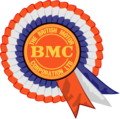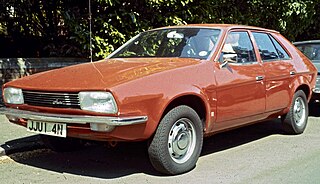
Jaguar is the luxury vehicle brand of Jaguar Land Rover, a British multinational car manufacturer with its headquarters in Whitley, Coventry, England. Jaguar Cars was the company that was responsible for the production of Jaguar cars until its operations were fully merged with those of Land Rover to form Jaguar Land Rover on 1 January 2013.

Morris Motors Limited was a British privately owned motor vehicle manufacturing company formed in 1919 to take over the assets of William Morris's WRM Motors Limited and continue production of the same vehicles. By 1926 its production represented 42 per cent of British car manufacture—a remarkable expansion rate attributed to William Morris's practice of buying in major as well as minor components and assembling them in his own factory. Self-financing through his enormous profits Morris did borrow some money from the public in 1926 and later shared some of Morris Motors' ownership with the public in 1936 when the new capital was used by Morris Motors to buy many of his other privately held businesses.
The automotive industry in the United Kingdom is now best known for premium and sports car marques including Aston Martin, Bentley, Caterham Cars, Daimler, Jaguar, Lagonda, Land Rover, Lister Cars, Lotus, McLaren, MG, Mini, MOKE, Morgan and Rolls-Royce. Volume car manufacturers with a major presence in the UK include Nissan, Toyota and Vauxhall Motors. Commercial vehicle manufacturers active in the UK include Alexander Dennis, Ford, IBC Vehicles, Leyland Trucks and London Electric Vehicle Company.

The British Motor Corporation Limited (BMC) was a UK-based vehicle manufacturer, formed in early 1952 to give effect to an agreed merger of the Morris and Austin businesses.

The Morris Marina is a front-engined, rear-wheel-drive small family car that was manufactured by the Austin-Morris division of British Leyland from 1971 until 1980. It served to replace the Morris Minor in the Morris product line, which had first been built in 1948. The Marina was also sold in some markets as the Austin Marina, the Leyland Marina and the Morris 1700.

The Austin Allegro is a small family car that was manufactured by the Austin-Morris division of British Leyland from 1973 until 1982. The same vehicle was built in Italy by Innocenti between 1974 and 1975 and sold as the Innocenti Regent. The Allegro was designed as a replacement for the Austin 1100 and 1300 models. In total, 642,350 Austin Allegros were produced during its ten-year production life, most of which were sold on the home market, less than a third of 2.1 million 1100s and 1300s sold in the previous 11 years.

British Leyland was an automotive engineering and manufacturing conglomerate formed in the United Kingdom in 1968 as British Leyland Motor Corporation Ltd (BLMC), following the merger of Leyland Motors and British Motor Holdings. It was partly nationalised in 1975, when the UK government created a holding company called British Leyland, later renamed BL in 1978. It incorporated much of the British-owned motor vehicle industry, which in 1968 had a 40 percent share of the UK car market, with its history going back to 1895.

The Rover Group plc was the British vehicle manufacturing conglomerate known as "BL plc" until 1986, which had been a state-owned company since 1975. It initially included the Austin Rover Group car business, Land Rover Group, Freight Rover vans and Leyland Trucks. The Rover Group also owned the dormant trademarks from the many companies that had merged into British Leyland and its predecessors such as Triumph, Morris, Wolseley, Riley and Alvis.
British Motor Holdings Limited (BMH) was a British vehicle manufacturing company known until 14 December 1966 as British Motor Corporation Limited (BMC). BMH was created as a holding company following BMC's takeover of both Jaguar Cars and the Pressed Steel Company in that year.

The Princess is a large family car produced in the United Kingdom by the Austin-Morris division of British Leyland from 1975 until 1981. The car inherited a front-wheel drive / transverse engine configuration from its predecessor, the Austin/Morris 1800 range. This was still unusual in Europe for family cars of this type and gave the Princess a cabin space advantage when compared with similarly sized cars from competing manufacturers.
The Austin Rover Group was a British motor manufacturer. It was created in 1982 as the mass-market car manufacturing subsidiary of British Leyland (BL). Previously, this entity had been known as BL Cars Ltd which encompassed the Austin-Morris and Jaguar-Rover-Triumph divisions of British Leyland. After a major restructuring of BL's car manufacturing operations, Jaguar regained its independence whilst the Triumph and Morris marques were retired. The new, leaner car business was rechristened as the Austin Rover Group and focused primarily on the Austin and Rover marques. The Morris and Triumph marques continued briefly within ARG until 1984 when both were dropped.
Innocenti was an Italian machinery works, originally established by Ferdinando Innocenti in 1920. Over the years, they produced Lambretta scooters as well as a range of automobiles, mainly of British Leyland origins. The brand was retired in 1996, six years after being acquired by Fiat.

The Austin Maxi is a medium-sized, 5-door hatchback family car that was produced by Austin and later British Leyland between 1969 and 1981. It was the first British five-door hatchback.

BMC ADO17 is the model code used by the British Motor Corporation (BMC) for a range of large family cars manufactured from September 1964 to 1975. The car was initially sold under the Austin marque as the Austin 1800, then by Morris as the Morris 1800, by Wolseley as the Wolseley 18/85, and later the Austin 2200, Morris 2200 and Wolseley Six. The 1800 was voted European Car of the Year for 1965.
Leyland Trucks is a medium- and heavy-duty truck manufacturer based in Leyland, Lancashire, United Kingdom. It can trace its origins back to the original Leyland Motors, which was founded in 1896, and subsequently evolved into British Leyland. After British Leyland became the Rover Group in 1986, the truck business was spun off and merged with DAF Trucks to form DAF NV, operating as Leyland DAF in the UK.

The Authi car company of Pamplona, Spain, was founded in 1965 as a result of a collaboration between BMC and NMQ.
Harold John Musgrove was the chairman of British Leyland's Austin Rover division between 1982–1986 and worked in several roles for the British National Health Service from 1991–2001.

Pressed Steel Company Limited was a British car body manufacturing business founded at Cowley near Oxford in 1926 as a joint venture between William Morris, Budd Corporation of Philadelphia USA, which held the controlling interest, and a British / American bank J. Henry Schroder & Co. At that time the company was named The Pressed Steel Company of Great Britain Limited. It acquired Budd's patent rights and processes for use in the United Kingdom. Morris transferred his interest to his company, Morris Motors Limited.
Donald Gresham Stokes, Baron Stokes was an English industrialist. He was the head of British Leyland Motor Corporation Ltd (BLMC) from 1968 to 1975.
John Norman Romney Barber was a British businessman who held senior director positions at Ford of Britain, AEI and at British Leyland.











